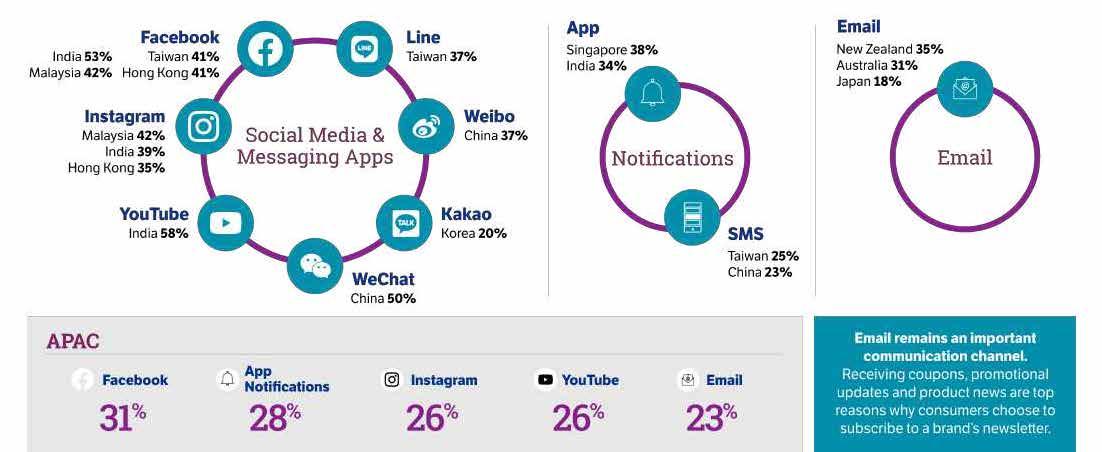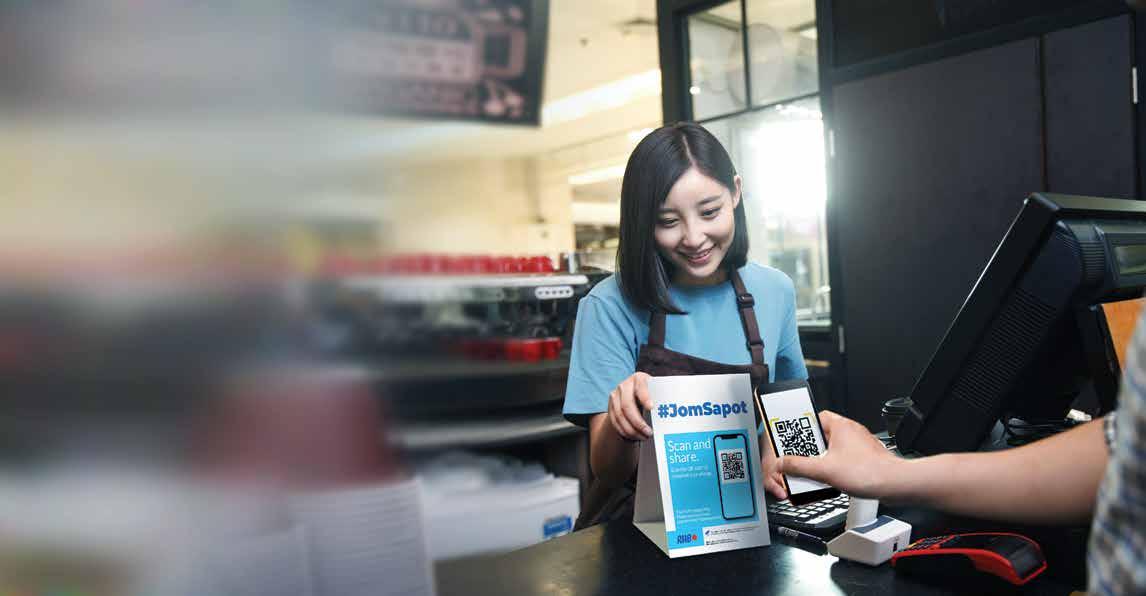
32 minute read
Recap of News and Happenings in the Retail Sector
Since March 2020, the Malaysian government had given more than RM255 billion in incentives to jumpstart the economy which was affected by the Covid-19 pandemic. Its latest addition, the Pelan Jana Semula Ekonomi Negara (PENJANA) stimulus package, introduced in June 2020, is valued at RM35 billion. Listed here are some of the incentives of this package, compiled by Stratos Consulting Group Sdn Bhd, a market research consulting firm.
Zero% Tax Rate for:
• 10 years for companies in the manufacturing sector with investments in fixed assets between RM300 million to RM500 million; and • 15 years for companies in the manufacturing sector with investments in fixed assets exceeding RM500 million.
• 100% investment tax allowance for 3 years for an existing company in Malaysia that will relocate its overseas facilities into the country;
• A special reinvestment allowance for selected manufacturing and agricultural activities for the year of assessment 2020 to 2021;
• Income tax rebate of up to RM20,000 per year for the first 3 years for a small and medium-sized enterprise (SME) incorporated between 1st July 2020 and 31st December 2020.
• The exemption of stamp duty on any instruments executed for mergers and acquisitions between 1st July 2020 and 30th June 2021.
• Eligible businesses can receive up to 50% remission of penalties for the late sales and service tax (SST) payments due and payable from 1st July 2020 to 30th September 2020.
• Enhanced Accelerated Capital Allowance program to include capital expenditure incurred on information and communications technology (ICT) equipment.
• Tax deduction on reduction or waiver of rental – landlords were eligible to tax deductions equivalent to the 30% reduction in rental from April to June 2020. This has now been extended to September 2020 under the PENJANA package. This incentive is eligible for landlords who rent their premises to SME tenants and the premises must be used for their business operations.
Incentives For Tourism Sector
• Personal income tax relief of up to RM1,000 incurred on domestic travel between 1st March 2020 to 31st August 2020. Now extended to December 31, 2020. • Businesses in the tourism industry (airlines, hotel operators, travel agencies, etc.) are eligible to defer on their income tax instalments for the periods: • 1st April 2020, to 30th September 2020. • 1st October 2020, to 31st December 2020. • Service tax exemption for hotels extended to 30th June 2021 (previous deadline: 31st August 2020).
Incentives for Property Sector
• Reintroduction of Home Ownership Campaign • Developers to provide at least 10% discount on price of property • 70% margin on housing loan for a third residential property valued at RM600,000 and above will be lifted – pending confirmation from the Malaysian government. • Stamp duty exemption for instruments of transfer (limited to first RM1 million) and loan agreements (full exemption) for purchase of a residential property valued between RM300,000 to RM2.5 million – executed between 1st June 2020 and 31st May 2021.
Exemption of Real Property Gains Tax
• Exemption on gains arising from the disposal of residential property from 1st June 2020 to 31st December 2021 – limited to 3 residential property per individual Malaysian citizen.
PENJANA SME financing
• Banking sector to provide RM2 billion at an interest rate of 3.5%, to eligible SMEs (who can individually apply for a maximum RM500,000).
PENJANA Microfinancing
• Banking sector to provide 400 million at an interest rate of 3.5%, to eligible micro-enterprises (who can individually apply for a maximum RM50,000).
• RM50 million allocated by the government to assist women entrepreneurs.
SME Go-Scheme Liquidity Support
• The SME Bank to provide RM1.6 billion in liquidity support to 16,000 G2 and G3 contractors awarded projects under the previous two stimulus packages.
Digitalisation of SMEs
• The SME Digitalisation Matching Grant, totalling RM100 million, developed in cooperation with telecommunication companies in the country;
• The SME Technology Transformation Fund, which has prepared RM500 million ringgit in loans. Application for the loans opens in July 2020; and
• The Smart Automation Grant, totalling RM100 million – maximum amount: RM1 million.
• RM1 billion set aside for PENJANA tourism financing, to help SMEs adapt to the ‘new normal’ and remain sustainable.
Relief for COVID-19 Expenses
• Scope and period expanded in relation to expenses allowed as a tax deduction for the prevention of COVID-19. This includes the cost of protective equipment and screening tests.
Incentives for the purchase of passenger cars (from June till year-end)
• 100% tax exemptions for locally-produced cars; and
• 50% sales tax exemption on imported cars.
Extension of The Wage Subsidy Program (Extended for 3 months until September 2020)
• Employers with workers earning less than RM4,000 per month will be eligible to receive RM600 per employee, up to a maximum of 200 employees.
• Incentive enhanced to allow employers receiving wage subsidies to implement reduced work weeks and unpaid leave.
Flexible Work Arrangement Incentives
• Further tax deductions effective 1st July 2020 for employers who implement flexible work arrangements (such as work-from-home policies), and employees who receive cell phones, tablets, and notebooks from their employer are eligible for individual income tax exemption of up to RM5,000;
• Employees to receive individual income tax relief of up to RM2,500 on purchases of cell phone, tablet and notebook, effective from 1st June 2020.
Relief Financing for Bumiputera Entrepreneurs – Dedicated Financial Assistance of RM200 Million Through PUNB and RM300 Million Through MARA for Bumiputera Businesses:
• Working capital • Operational expenditure • System automation • Expenditure to implement COVID-19 health protocols and • Financing of 50,000 ringgit (US$11,600) to 1 million ringgit (US$233,000) at an interest rate of 3.5% for up to five years.
• Majlis Amanah Rakyat (MARA) – the government agency responsible to aid, train, and guide Bumiputeras in the areas of business and industry – the government has allocated 300 million ringgit (US$70 million) to assist Bumiputera entrepreneurs, who can also receive up to 1 million ringgit (US$233,000) at an interest rate of 3.5%.
Support for The Agriculture Industry
• Micro-credit financing scheme worth RM350 million at an interest rate of 3.5% per year, for ‘agropreneurs’ to receive up to RM50,000, repayable in a 5-year tenure.
Reskilling and Upskilling Programs
• Some 2 billion ringgit (US$467 million) in funding has been allocated to help with the reskilling of graduates and the unemployed. • The funds will go towards optimizing short courses in local universities and training programs provided by government agencies.
Assistance to The Most Vulnerable in The Community
• The package will provide 108 million ringgit to help the most vulnerable members of society.
Hiring of Local Workers
• Apprenticeships for fresh graduates and school leavers (up to RM600 per worker per month); • RM800 for businesses hiring an employee below the age of 40 for up to 6 months; and • RM1,000 for hiring an employee above the age of 40 or a person with a disability. • Training allowance (up to RM4,000) and skills development programs for reskilling graduates and unemployed individuals – RM2 billion in allocation. • Grants of up to RM5,000 for registered child care centre operators; • RM800 e-voucher for parents who apply online for nanny services
One-off Cash Payment of RM300 for Single Mothers and Disabled Persons Registered with the Social Welfare Department (SWD):
• 190,000 registered disabled persons; • 150,000 single mothers who are below the poverty line; and • 2,000 volunteer home help services.
Shop Malaysia Online Campaign (RM70 Million Allocation)
• RM50 one-off e-wallet credit for citizens earning less than RM100,000 annually • Individual tax relief of up to RM2,500 (from June onwards) for the purchase of handsets, laptops and tablets, to facilitate remote working arrangements.
Unemployment rate Hits Multi-year High
• Within a month, unemployment rate shot up nearly 1.5 times from 3.4% in March to 5% in April, the highest known to Malaysia in 30 years. That’s almost 800,000 jobless people in the country – 48.8% higher than the year before, and more than the unemployment rate during the Asian Financial Crisis of 1997 and the Great Recession of 2008 (3.2% and 3.7% respectively). • Research carried out by the Ambank Group showed that unemployment rates could hit 6% or higher – considering how the pandemic has already changed consumer sentiments and affected entire industries – manufacturing, F&B, arts, entertainment, child care, beauty are among the hardest hit sectors according to Department of Statistics Malaysia.
Delays in New Mall Openings & Subdued Interest in Retail Investments
• Delays in new mall completions is inevitable, according to Savills Malaysia’s ‘In the Asian Cities Report – Kuala Lumpur’ report.
• Projects affected are KL East Mall, Setia City Mall Phase 2, The Exchange TRX, Mitsui Shopping Park Lalaport, Pavilion Bukit Jalil, Pavilion Damansara Heights, Warisan Merdeka Mall and IOI City Mall Phase 2.
• The report said retail space in the Greater KL would see an extra 13.5 mil sq. ft. of net lettable retail space, in the next 2 years with 63.6% of it being expected to be completed in 2021.
• Investment activity in the retail sector most likely be stagnant and restricted for the remaining months of the year, though some opportunistic investors may find this period attractive to position their capital albeit with some challenges.
• A drop in average occupancy rate in the Greater KL was also reported, as it fell by 0.9% to 87.2% in the first quarter of the year. Despite the slight decline in average occupancy rate, the rate remained stable as it was supported by well-managed malls.
• Suburban malls located in high-rise residential areas were recovering faster than city-centre malls as workers whose offices are located in the city centre were still encouraged to work from home.
• Savills mentioned that deliveries and takeaways would continue being important channels for retail, as a decrease in window shopping could be expected in the future.
Large Declines in Sector Values (April 2020 vs 2019)
The Department of Statistics Malaysia reported that the wholesale and retail sector’s value fell by 36.6% to RM66.9 billion in April y-o-y. • Non-specialised wholesale trade fell 45.2% • Other specialised wholesale trade fell 39.4% • Retail sales declined 32.5%
The decline was mainly contributed by: • Near stagnant motor vehicle sales (down a whopping 93.2% or RM11.5 billion) • Decreased retail sales (down 32.5%, or RM13.5 billion); and • Wholesale trade (down 27.2%, or RM13.5 billion). In its entirety, the wholesale and retail trade contracted by 38.6% compared to the same month in 2019.
Instant Retail for Grab Mart
• GrabMart expanded its services with Instant Retail, which taps into retail SME, allowing them to access Grab’s network of users, following a triple increase in sales for convenience and grocery businesses on GrabMart during the MCO. • Grab Malaysia’s managing director said that the new Instant Retail feature would help retailers who traditionally depended on foot traffic and walk-ins to run their businesses, amid a more challenging environment for physical retail. • The new service is also in line with the government’s new initiative of ‘Shop Malaysia Online’.
Gradual Recovery and Major Malls
• Mall operators such as Suria KLCC and Sunway Malls have been giving out vouchers to get shoppers back into their malls, while restaurants and other retailers are holding reopening promotions and discounts, following the easing of the MCO. • It was reported that footfall in some malls had only recovered to about half the numbers at the beginning of the year, while demand for services continued to weaken as people were still staying at home. • According to the president of Malaysian Shopping Malls Association, the total loss of sales was estimated at RM1.8 billion during the MCO. • The CEO of Sunway Malls & Theme Parks said that its malls were seeing a recovery in footfall of 60-70%, while tenants’ sales recovered by 30-40%. The company is expecting a 75-85% recovery of footfall by end of this year.
Survival Plus Recovery Mode
• Hektar REIT, whose portfolio includes Subang Parade, Mahkota Parade, Wetex Parade, Segamat Central, Central Square and Kulim Central, will go into a “Survival Plus Recovery Mode” for the remainder of the financial year ending 31st December 2020.
• Hektar Asset Management Sdn Bhd’s Executive Director and Chief Executive Officer Dato’ Hisham Othman stated that maintaining cash flow, and retaining tenants are the Group’s top priorities at the moment.
• Despite the crisis, the REIT is still committed to its core business – retail assets, and is actively looking at potential acquisition targets, explaining that it believes there are still under-served markets in the country’s retail sector. Internal discussions within Hektar are also underway with the intent of formulating a strategy for the Group to diversify its non-retail assets.
New Openings
• Ideal United Bintang International Bhd targets to open the 1st Avenue Virtual Mall in Penang in 3Q2020 following the completion of its acquisition of the mall located on Jalan Magazin. will fuse digitalisation and information technology with the brick-and-mortar component. • Tesco Tesco Stores Malaysia opened two new stores in June in Mines, Seri Kembangan, and Teluk Intan Perak. Tesco Mines, is a superstore with a size of 2,000 sq. metres while Tesco Teluk Intan, is 3,000 sq.metres. Both stores offer the scan and pay feature apart from the usual self-checkout counters. new store in Tambun, Bandar Sunway, Ipoh and in Tampoi, Johor, in June.
Restructuring at AEON Company
• AEON Co (M) Berhad and AEON BIG (M) Sdn Bhd restructured and combined into a single entity as part of its 10-year strategy to create an agile, resilient and “intra-preneurial” retail organisation in July, according to TheEdge.
• With both companies headquartered in one location, the new, simplified, “flat” structure at AEON Co is expected to
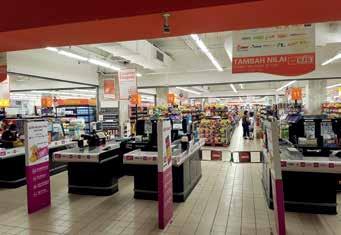
• IUBIB’s chairman mentioned that the first virtual mall
• TF Value Mart opened a lead to faster decision-making. • Econsave opened a new store each in Taman Teratai, Johor, and in Aulong, Perak.
• Kim Hin Joo (M) Bhd, the operator of Mothercare stores in Malaysia, has opened the first The Entertainer store in Sunway Pyramid. UK’s largest chain of toy stores will be joined by two new stores at the end of 2020.
• The newly-revamped Ramlee Mall in Suria KLCC has some new brands such as Le Labo, Gucci Beauty and COS. New eateries are also set to launch, with premium brands such as the Bathing Ape Cafe, Omotesando Koffee, David Rocco’s Dolce Vita, and the first pork-free Dragon-i restaurant in Malaysia.
• Paragon Market Place, a threestorey retail market located in Jalan Tampoi, Johor opened in June.
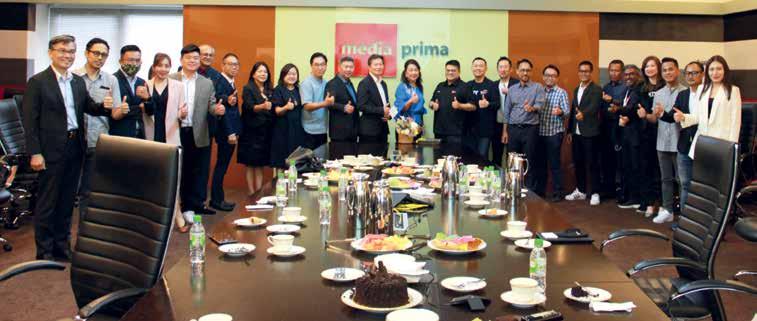
MRCA Visits Media Prima Office
bout 15 MRCA members led by its President Shirley Tay, visited A Media Prima office in the NSTP building at Jalan Riong, Bangsar, recently. The visit was part of MRCA’s “Engagement with the Media” programme.
Among those who attended were Deputy President Dato’ Liew Bin, Immediate Past Presidents Datuk Seri Garry Chua and Past President Dato’ Tay Sim Kim, Vice Presidents Ken Phua and Valerie Choo, Secretary General Stan Singh, Treasurer General Dato’ Winnie Lim, Council members Datuk Henry Yip, Liang Foo Kuan, Dr. Affendi Dahlan, Jordan Ng, Brian Tham and Christine Tan, Youth Chief Alex Chong and MRCA member Tan Soo Hui,
The team was welcomed by Michael Chan, Executive Director and Chief Executive Officer, Media Prima Omnia at Media Prima Bhd who later gave a briefing on Media Prima’s current direction and operations. The delegation also had a fruitful dialogue and gained insights into the workings of Media Prima Omnia.
The visitation is one of the series organised by MRCA with media owners.
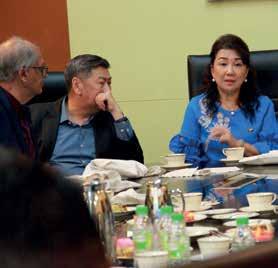




Short-term Economic Recovery Plan by Government
Here are some of the highlights of the Government’s short-term economic recovery plans as announced recently by Prime Minister Tan Sri Muhyiddin.
E-vouchers
SST
• Wage Subsidy
Programme, which allocates RM600 per worker, extended for another three months.
• Employers who are not allowed to operate during the Conditional Movement Control Order (CMCO), are allowed to apply for the wage subsidy programme.
• An employment subsidy programme worth RM1.5 billion. Companies will receive financial subsidies for giving jobs to the unemployed. An expected 300,000 people will benefit. • There are two incentives given to companies, whereby those that employ unemployed Malaysians under 40 will receive RM800 per worker and firms that employ those 40 years and above or persons with disabilities (OKU) will receive RM1,000. The incentives will be given for six months.
• Government has set-up
PENJANA – Pelan Jana
Semula Ekonomi Negara to empower people, propel businesses and stimulate the economy. It has 40 initiatives worth RM35 billion of which RM10 billion is a direct fiscal injection by the government. matched by local and tourism industry under be competitive in the new
grant for gig economy payments, the government social enterprises for social
assembled cars until 31st December 2020.
• My30 unlimited pass
for public transport users. Commuters pay RM30 a month for unlimited rides. It is open to all nationalities. Card is valid until 31st December 2020.
• Grants will be given to daycare (taska) operators for implementing and adhering to the SOPs (standard operating procedures) set by
• E-vouchers available for those who order childminders’ services online. • Up to a RM3,000 incentive of individual income tax for fees paid by parents to taska and tadika (kindergartens).
• Campaign Shop Malaysia Online to encourage trade via e-commerce platforms using the government.
promo codes and discount vouchers. Government allocating RM70 million, which would be matched by e-commerce platforms.
• Banking sector allocates RM2 billion to assist SMEs, where applications began mid-June, with a threshold of
• RM400 million to fund Penjana microcredit by Tekun and Bank Simpanan Nasional with RM50 million allocated, especially for female entrepreneurs.
• RM1 billion for the Penjana Tourism Funding to ensure that the country’s tourism industry can still normal.
• Cash-flow aid by SME Bank for G2 and G3 contractors that have been awarded minor government projects.
• RM10 million allocated to the Malaysian Global
Innovation and Creativity
Centre (MaGIC) to fund projects to address issues faced by vulnerable groups. • Penjana Nasional fund worth RM600 million to drive the process of digitalisation of businesses and innovation. A matching fund will be international investors.
• RM75 million allocated to draft policies related to the so-called gig economy.
• RM50 million matching workers’ EPF and Socso contribution.
• To encourage Malaysians to use contactless has allocated RM75 million to e-wallets, or RM50 per person. It is set to benefit 15 million Malaysians.
• 100% tax exemption
for the purchase of locally RM500,000 per SME. RM1 million of house value developer must offer at
• Full exemption of
tourism tax until 30 June 2021.
• Exemption of Services
Tax on lodgings and accommodation services extended until 30th June 2021.
• Lessen companies’ financial burden through the waiver of penalty to companies that are late in submitting payment for SST as well as extension of various tax exemptions.
• Tax exemption of RM5,000 for employees who are provided with a smartphone, tablet or laptop by their employers.
• RPGT exemption for
residential property from 1st June 2020 to 31st December 2021 of up to 3 • The stamp duty exemption on property transfers limited to the first and is applicable for sales and purchase agreements signed from 1 June 2020 to 31st May 2021 and subject to a condition that the
properties per individual. least 10 per cent discount.
TAX
Loan Repayment Flexibility For Borrowers Affected by Covid-19
Businesses, Small and Medium Enterprises (SMEs) and individual borrowers can apply directly to their respective banks beginning Aug 7, 2020 to obtain loan repayment flexibility, says Bank Negara Malaysia.
ank Negara, in a statement, B said that it had informed the banks to deliver a simplified application and documentation process for borrowers. “In recognition of these exceptional circumstances, the flexibilities provided to borrowers during this period will not appear in the CCRIS reports of borrowers.”
It added that a more targeted approach to help SME and individual borrowers would ensure that financial resources and attention are prioritised. “It is recognised that income and cashflow challenges remain for some, especially those who have lost their jobs or experienced a reduction in incomes.”
The banking industry will provide a targeted moratorium extension and provision of repayment flexibility. Individuals who have lost their jobs in 2020 and have yet to find a job, will be offered an extension of the loan moratorium for a further three months by their bank.
Individuals who are still in employment but whose salaries have been affected due to Covid-19 will be offered a reduction in loan instalments in proportion to their salary reduction, depending on the type of financing.
Banks will offer flexibility for a period of at least six months and will also consider extending the flexibility at the end of that period, bearing in mind the salary of the borrower at that time, it said.
For hire purchase financing, affected borrowers will be offered revised instalment schedules that are consistent with the Hire-Purchase Act 1967.
In addition, banks have also committed to providing repayment flexibility to other individuals and all SME borrowers affected by Covid-19. The flexibility offered by each bank will take
TARGETED EXTENSION OF MORATORIUM AND REPAYMENT FLEXIBILITY for borrowers still financially affectedby Covid-19
FOR INDIVIDUAL BORROWERS
Loss of job and income in 2020
Extension of loan moratorium by 3 more months
Reduction of salary
Reduction of instalment amount for at least 6 months in proportion to their salary reduction
FOR OTHER BORROWERS INCLUDING SMES
Viable business that issuffering from cash flow problems Other individual borrowers who face difficulty to repay
• Pay only interest for a period of time; or • Reduce monthly instalments by extending loan period; or • Other flexibility until borrower can resume full repayment
WHEN
Approach your banks or AKPK starting 7 August 2020
HOW TO APPLY
Approach your banks to discuss and apply for repayment flexibility
Understand and agree on new repayment terms and schedule
If a suitable repayment plan cannot be agreed upon: • Individuals can approach AKPK • SMEs can apply for Small Debt Resolution Scheme (SDRS)
• For Hire Purchase, affected borrowers will be offered revised instalment schedules that are consistent with the Hire Purchase Act 1967 • The above extension will not affect your CCRIS credit report

into account the specific circumstances of borrowers. These includes: • Allowing borrowers to pay only the interest portion of the loan over a period of time e was quoted in the Star H newspaper recently that he was optimistic about the year-end festive period based on August sales and car traffic flow which recovered to about 80 per cent compared to last year.
“People are spending but there are concerns on the loan moratorium expiry which will weigh down sentiment. We will need to monitor that closely week-on-week in October. Good traction are from food and beverage, athletic and leisure wear, skincare and certain fashion categories, “he told the English daily adding that group has installed sensors for footfall, car traffic and at point of sales during the MCO.
Sunway Group owns and operates Sunway Pyramid Mall, Sunway Putra Mall, Sunway Velocity Mall, Sunway Carnival Mall, Sunway Giza Mall, Sunway • Lengthening the overall period of the loan to reduce monthly instalments; or • Providing other forms of flexibility until a borrower is in a more stable position to resume repayments in full. Citrine Hub and Sunway Big Box Retail Park.
He also told the daily that the pandemic has “accelerated digitalisation and the need to integrate online and offline solutions. Early next year, the group will be launching a major digitalisation initiative to provide a full online and offline experience.”
“We still believe offline will continue to play a significant part both in terms of experience delivery and income generation. Products and services like leisure and entertainment will become the staple of physical malls. Things that can be commoditised like clothes and shoes will move online,” Chan told the daily.
Chan was also quoted in the New Straits Times newspaper that with
“All other borrowers who have the means should start to repay as it will reduce their overall debt and borrowing cost,” Bank Negara said in the statement.
To ease concerns of borrowers with loans from multiple banks, they may also approach the relevant “one-stop” centre to work out an appropriate assistance package: • For individuals, Agensi Kaunseling dan Pengurusan Kredit (AKPK) • For SMEs, Small Debt Resolution Scheme (SDRS)
“Bank Negara will monitor the progress of banks in assisting borrowers that may continue to face temporary financial difficulties. The Bank will also continue to focus efforts in ensuring that the banking system continues to carry out its intermediation function effectively in support of the
Sunway Malls Cautiously Optimistic Sales Normalising in Q4
Sunway Malls and Theme Parks are showing signs of recovery and sales and traffic are expected to normalise by year end says its chief executive officer HC Chan.
economic recovery,” it added.

the outbreak of the pandemic, most businesses, irrespective of size, scale and industry, would see contraction this year, except those with exposure in technology, medical and protection industries.
“Everyone is impacted, the question is the degree of impact. Hence now, ingenuity is called for to address cost containment and demand management initiatives. We are immensely hopeful that when the world does eventually recover fully, we will be enjoying a slightly higher growth,” he told the English daily.
Physical Stores Remain Relevant To The Modern Shopper

Although more than two-thirds of Malaysians prefer to purchase in-store, how merchants interact with customers has changed and is inherent to their success, according to Wirecard Global Shopping Report.
espite the worldwide boom D in online retail over the past years, shopping in physical stores is still key for consumers worldwide – but only if the purchasing experience integrates all sales channels, innovative technology and data-driven incentives.
These findings are part of a global study of 6,000 consumers over the age of 18 in Australia, Brazil, France, Germany, Hong Kong, Malaysia, the Philippines, Singapore, Thailand, the U.K. and the United States, commissioned by Wirecard, the global innovation leader for digital financial technology. The survey was done in Q4 2019.
“Our research has revealed that consumers clearly desire choice when completing purchases. Consumers shop in many different ways nowadays and this is challenging merchants to meet a wide range of retail demands,” commented Markus Eichinger, EVP Group Strategy at Wirecard.
“A lot of focus is put on pricing, but not necessarily on the flexibility customers seek. A unified commerce strategy, with a focus on a consistent and frictionless buying journey, is integral to offering consumers the experience they would expect from any modern retailer.
“In the future, brick and mortar stores will only exist if they are technologically advanced with the latest in-store innovations and a fully integrated e-commerce backend.” Digital payments are now predominant in the purchasing process – with over 90% of consumers having used cashless payment methods both online and in-store.
Three-quarters (84%) of consumers surveyed are willing to share personal data in return for incentives.
Physical stores remain the predominant choice for the Malaysian shopper to make their purchases, followed by mobile apps.
Interest In New Technologies The Need For Consistency


KEY FINDINGS
Consumers need consistent offerings across all sales channels
While 68% of shoppers in Malaysia are most likely to purchase in-store over the past 12 months, the research shows that consistent cross-channel experiences are vital to consumers. Nine out of 10 either research the products they want to purchase online before buying in-store afterwards (98%) or vice versa (97%).
Malaysians also prefer to use an app or the store website via their phone (87%) to do research while in-store, compared to other methods like in-store screens or a VR booth.
Merchants not offering Unified Commerce possibilities will lose out
The rise in popularity of more advanced cross-channel purchasing options, such as buying online and then picking up in-store (BOPIS), further supports this finding. About 45% of Malaysians purchase through click-and-collect options where they buy online and collect in-store. About 80% of Malaysian respondents say that if a brand or merchant doesn’t offer these kinds of options, it would have at least some influence in their decision to shop there.
Maintaining an up-to-date online shop is key
While physical stores are the preferred buying location, how and when people find goods varies, with online browsing offering shoppers the most convenience. Consumers will shop online most often while they are relaxing (82%), in bed (48%), watching TV (40%) and while on holiday (40%).
On average, Malaysians order products from a foreign website 18 times a year, with half (58%) doing so at least once every month. They do so to get products not available locally (70%) or are cheaper (51%). However, 95% indicated that the lack of a familiar payment method would influence their decision to order products from a foreign website.
Consumers appreciate data-driven services and offerings
A majority of consumers value datadriven, customer-centric value-added services with loyalty programs. About 84% of Malaysian consumers reported that they would be willing to give retailers personal information in exchange for incentives such as a larger discount. Most Malaysian shoppers (92%) use loyalty programs, with 40% preferring to accumulate loyalty points through their mobile apps and phone numbers, similar to countries like Hong Kong and Singapore.
Cashless payments are omnipresent
Nearly all (93%) respondents are now using cashless payment methods when they shop in physical stores. The main reasons for paying cashless in-store is speed (40%), ease (25%) and security (23%). More than half (55%) of the Malaysians surveyed indicated that they are less likely to shop at a physical shop if it did not offer ways to pay via their mobile phones, compared to the global average of 45%.
“Retailers that want to engage with their customers via targeted offers, and improve their service across all channels need to leverage on customer data. Our report shows that if customers can see a concrete benefit when it comes to providing personal information, they are willing to share it with retailers, thus providing merchants critical data which they can analyze to optimize their offerings and improve customer loyalty,” continued Markus Eichinger.

Other Key Findings From The Research
72% of Malaysian
shoppers are interested to use biometric data e.g. facial recognition, fingerprint) to purchase products in-store and online. Consumers would
spend an average of RM 63 more
if the payment is authorized with biometric data compared to a cashless payment that does not need authorization. When shopping in-store, Malaysians’ preferred method of payments is:
swipe debit/credit card (63%), mobile wallets (42%) and contactless card
payment (32%).
77% are interested
to use technologies like mobile apps, smart mirrors and VR while shopping. Environmentallyfriendly options resonate strongly with Malaysians, with 86% citing
that being environmentally-
friendly is a major purchase factor and 88% of respondents saying they would be willing to pay more for these products.
MRCA and Busan Economic Promotion Agency Sign MoU for Business Collaboration
ifteen MRCA member F companies recently participated in an online business to business matching event organised by the Busan Economic Promotion Agency.
The MRCA team was led by its President Shirley Tay. Also present were Vice Presidents Datuk Seri KK Chai and Valerie Choo, Secretary General Stan Singh, Treasurer General Dato’ Winnie Lim and Council member Aiveen Wong.
A total of 93 companies from Busan, South Korea, took part in the inaugural online B2B event which saw a vibrant online business matching among the participants. Product matching included health food products, snacks, beauty and hair care products, baby products and electrical products, among others.
The event also saw the Shirley Tay signing the MoU on behalf of MRCA. One of the objectives of the MoU is to further build trade relations between the two associations.

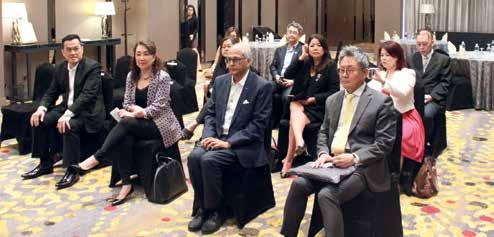
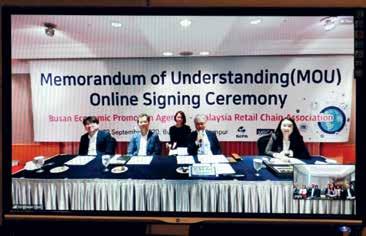




Youbeli Teams Up with Taiwanese e-Commerce PChomeSEA for Cross-Border Shopping Experience
Exclusive partnership allows Malaysian online shoppers delivery of more than 5 million high quality products to Malaysia.
n celebrating the partnership, I Youbeli, the homegrown e-commerce brand will be offering free delivery nationwide with no minimum purchase.
Chua Khai Suan, Chief Executive Officer of Youbeli, said that Malaysian online shoppers have become more sophisticated in their choices of products. “With the current Movement Control Order (MCO) implemented as the Government that encourages Malaysians to shop online, Youbeli has decided to secure this exclusive partnership with PChomeSEA. With the current free delivery promotion, we hope that Malaysian online shoppers will enjoy high-quality products while saving on postage.”
Sam Tsai, Managing Director of PChomeSEA, Taiwan’s largest e-Commerce platform, said that Taiwan has built a reputable online shopping experience for the past 20 years with an annual e-commerce transaction that exceeds the annual transactions in all 10 countries in the Southeast Asian region.
“Therefore, we take pride in our Made in Taiwan (MIT) label that ensures affordable products without compromising on the quality. To date, PChomeSEA offers more than 5 million different products featured in more than 300 million listings,” he said.
Youbeli listed Electronics, Health & Beauty and Home & Living category to be the top categories under PCHomeSEA that were estimated to garner the highest traction among Malaysian shoppers as Taiwan has also been recognised as among the top manufacturers of high-quality products in Asia.
Chua also said that the longstanding bilateral relations between Malaysia and Taiwan in various aspects of the economy and social development has made Taiwan an attractive option for Malaysians to shop online.
Chua hopes to expand the Youbeli brand to other Southeast Asian countries within the next two years. “We have various plans in the pipeline and we can’t wait to excite Malaysian online shoppers with new announcements soon,” he added. During the recent ePenjana RM50 campaign, Youbeli recorded a 300% increase in sales transactions.
The platform boasts a trilingual setting to reach out to as many shoppers as possible. Other than debit and credit card, Youbeli also accepts payment via Touch ‘n Go, Boost, GrabPay, Razer, MCash, GoPayz, Zapp, kiplePay and other e-wallets. Malaysian online shoppers can start making purchases from PChomeSEA on Youbeli website and mobile apps. The app is available for free download via App Store and Google Play.

Chua Khai Suan, CEO of Youbeli.
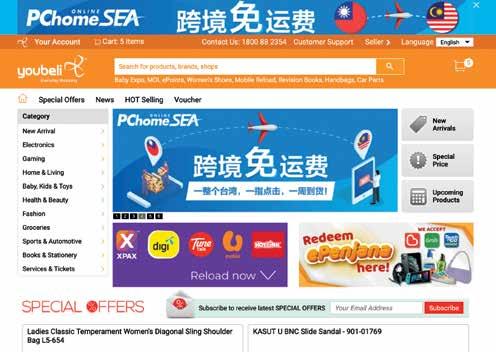
Youbeli, a homegrown e-commerce brand announces exclusive partnership with PChomeSEA, the largest e-Commerce platform in Taiwan.
AmInvestment Bank Clinches Four Awards at RAM League Awards 2020
mInvestment Bank Berhad A clinched four awards at the 17th Annual RAM League Awards 2020 held in Kuala Lumpur recently. The RAM League Awards recognises outstanding accomplishments and leadership in the Malaysian bond market.
AmInvestment Bank placed joint second in the number of issues category and placed third in the programme value category for the Lead Manager Awards 2019 (Bonds and Sukuk). AmInvestment Bank also placed joint second in the number of issues and placed third in the programme value category and category for the Lead Manager Awards 2019 (Sukuk) respectively.
Commenting on the awards, Tracy Chen, Deputy Chief Executive Officer, AmInvestment Bank Berhad, said,” We are honoured to have received these awards from RAM in recognition of our continued leadership in the corporate bond and Sukuk market by consistently or the ninth consecutive as the Best FX Bank for Corporates and Financial Institutions at the Alpha Southeast Asia Treasury & FX Awards 2020.
The Group also bagged another accolade by winning the Best FX Bank for Structured Products: Commodities, Credit, Equity, FX and Multi-Assets for FX & Treasury segment for the second time.
Jamzidi Khalid, Deputy Managing Director, Wholesale Banking and Head, Group Treasury & Markets, AmBank Group commented, ”Being recognised for the ninth time as the Best FX Bank for Corporates and Financial Institutions demonstrates our tenacity in delivering only the best services and

providing the best debt capital market solutions to our esteemed clients.”
Dato’ Sulaiman Mohd Tahir, Group Chief Executive Officer, AmBank Group, said, “We pride ourselves on the unique services we offer to our clients and solutions to our clients. These awards are a testament to the hard work of our talented team and their ability to curate innovative financing solutions for our clients, especially in these trying times.” these awards are a further indication that our efforts are being recognised in the industry and our perseverance in maintaining our leadership in the Malaysian corporate bond and Sukuk
AmBank Group Bags Two Awards at the Alpha Southeast Asia Treasury & FX Awards 2020
Fyear, AmBank Group was again recognised

market.”
Dato’ Sulaiman Mohd Tahir, Group Chief Executive Officer, AmBank Group, said, “We are pleased to see that AmBank Group continues to be recognised through these prestigious awards. We pride ourselves on listening and understanding the unique needs of our clients, from individuals to large corporates, and this has enabled us to deliver the right products and services. We thank our clients for their unwavering support and continued trust in AmBank,”
Alpha Southeast Asia is a Hong Kong-based regional institutional investment publication. It has a readership following among pension funds, asset managers as well as institutional investors across Asia, Europe and the United States.


